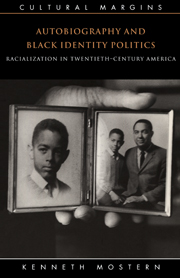Book contents
- Frontmatter
- Contents
- Acknowledgments
- Part one: Theorizing race, autobiography, and identity politics
- Part two: The politics of Negro self-representation
- Part three: The dialectics of home: gender, nation, and blackness since the 1960s
- 6 Malcolm X and the grammar of redemption
- 7 The political identity “woman” as emergent from the space of Black Power
- 8 Home and profession in black feminism
- Notes
- Works cited
- Index
7 - The political identity “woman” as emergent from the space of Black Power
Published online by Cambridge University Press: 02 December 2009
- Frontmatter
- Contents
- Acknowledgments
- Part one: Theorizing race, autobiography, and identity politics
- Part two: The politics of Negro self-representation
- Part three: The dialectics of home: gender, nation, and blackness since the 1960s
- 6 Malcolm X and the grammar of redemption
- 7 The political identity “woman” as emergent from the space of Black Power
- 8 Home and profession in black feminism
- Notes
- Works cited
- Index
Summary
Malcolm was the supreme black patriarch … The great black father was finally in our midst. But in 1965 black men murdered Malcolm, and with him died the chance for a black patriarchy.
Michele WallaceMeridian had walked until she wore herself out, and one thought had preoccupied her mind: “The only new thing now,” she had said to herself, mumbling it aloud, so that people turned to stare at her, “would be the refusal of Christ to accept crucifixion. King,” she had said, turning down a muddy lane, “ should have refused. Malcolm, too, should have refused … All saints should walk away. Do their bit, then – just walk away. See Europe, visit Hawaii, become agronomists or raise Dalmatians.”
Alice WalkerI want to hold the notion … that movements provoke theoretical moments.
Stuart HallPrincipally, this chapter weaves three specific women's constructions of blackness from the 1970s, in the wake of Malcolm X's manhood. Its central focus is the autobiographical work of Nikki Giovanni and Angela Davis from 1971 and 1974, work that does not name itself “feminist,” but suggests the possibilities and limitations for a radical analysis of gender that would be consistent with Black Power's structure of racialization. The form of autonomist feminism that emerges in the late 1970s with the Combahee River Collective, June Jordan (as analyzed in chapter one) and numerous others, I will suggest, emerges in the wake of particular limitations in these two texts. Something like this was suggested initially by Michele Wallace in her Black Macho and the Myth of the Superwoman, the third narrative that structures this chapter.
- Type
- Chapter
- Information
- Autobiography and Black Identity PoliticsRacialization in Twentieth-Century America, pp. 164 - 188Publisher: Cambridge University PressPrint publication year: 1999



